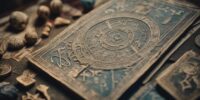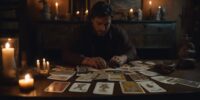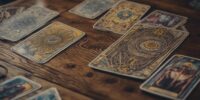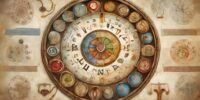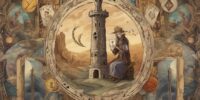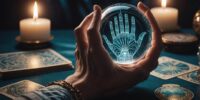Why the Inquisition Targeted Tarot Users as Heretics
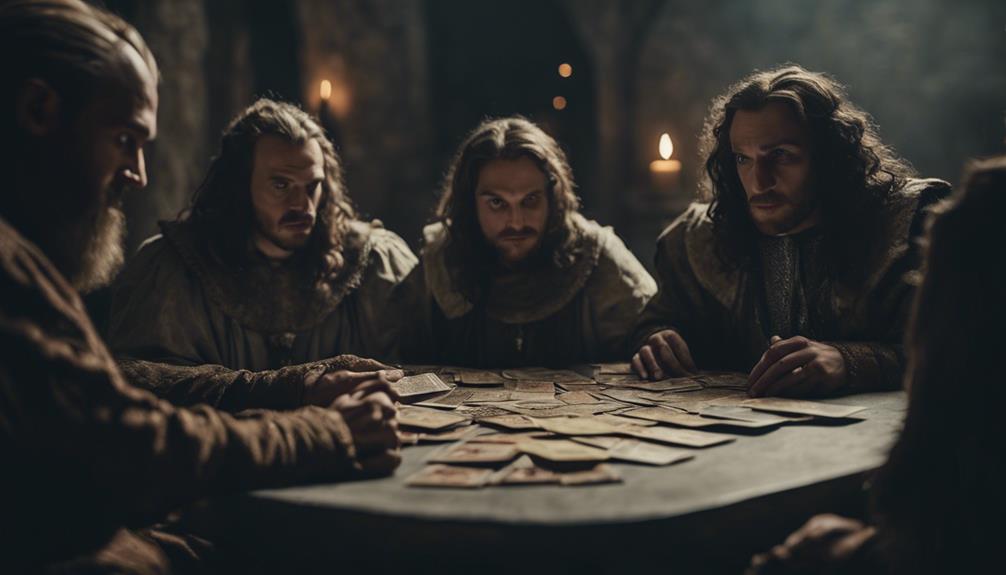
The Inquisition viewed tarot users as heretics because of the perceived danger posed by the enigmatic symbols they used. This perception led to a conflict between mysticism and established religious beliefs.
This clash between mysticism and orthodoxy highlighted the tension between traditional religious doctrine and alternative spiritual practices, with tarot users caught in the middle.
Origins of Tarot and Its Mystical Associations
The mystical origins of the Tarot cards have long intrigued seekers of ancient wisdom, with their historical origins dating back to the 15th century in Europe. Initially used as playing cards, the Tarot evolved to encompass mystical symbolism that captivated the imaginations of those exploring its enigmatic depths. Each card in the Tarot deck holds layers of meaning, reflecting archetypal figures, universal themes, and spiritual truths.
The Tarot's mystical symbolism is rich and multifaceted, drawing from various esoteric traditions such as Kabbalah, astrology, alchemy, and numerology. The Major Arcana, for instance, represents significant life events and spiritual lessons, while the Minor Arcana delves into everyday experiences and challenges. Through intricate artwork and symbolic imagery, the Tarot weaves a tapestry of wisdom that transcends time and culture.
Exploring the historical origins and mystical symbolism of the Tarot allows individuals to tap into a reservoir of ancient knowledge and intuitive insights. The allure of the Tarot lies in its ability to spark introspection, inspire creativity, and reveal hidden truths waiting to be discovered.
Tarot as a Tool for Divination
As seekers explore the mystical depths of the Tarot, they reveal its profound ability to serve as a tool for divination, offering insights into the past, present, and future through symbolic interpretation. The Tarot deck, with its intricate tarot symbolism, is a powerful instrument that connects individuals with their intuition and higher selves, providing spiritual guidance in times of uncertainty. Each card in the deck carries its own unique energy and meaning, creating a tapestry of wisdom that can illuminate the path ahead.
To better understand the Tarot's role as a divination tool, let's investigate a comparison between traditional playing cards and Tarot cards:
| Traditional Playing Cards | Tarot Cards |
|---|---|
| Mainly used for games and gambling | Primarily utilized for spiritual guidance and self-reflection |
| Consist of 52 cards with four suits | Comprise 78 cards divided into Major and Minor Arcana |
| Focus on practical matters and everyday life | Explore deeper psychological and spiritual themes |
| Limited symbolism | Abundant symbolism with rich meanings |
Through the exploration of Tarot as a tool for divination, individuals can reveal the hidden truths of their subconscious minds and seek clarity in the complexities of life.
The Inquisition's Stance on Divination Practices
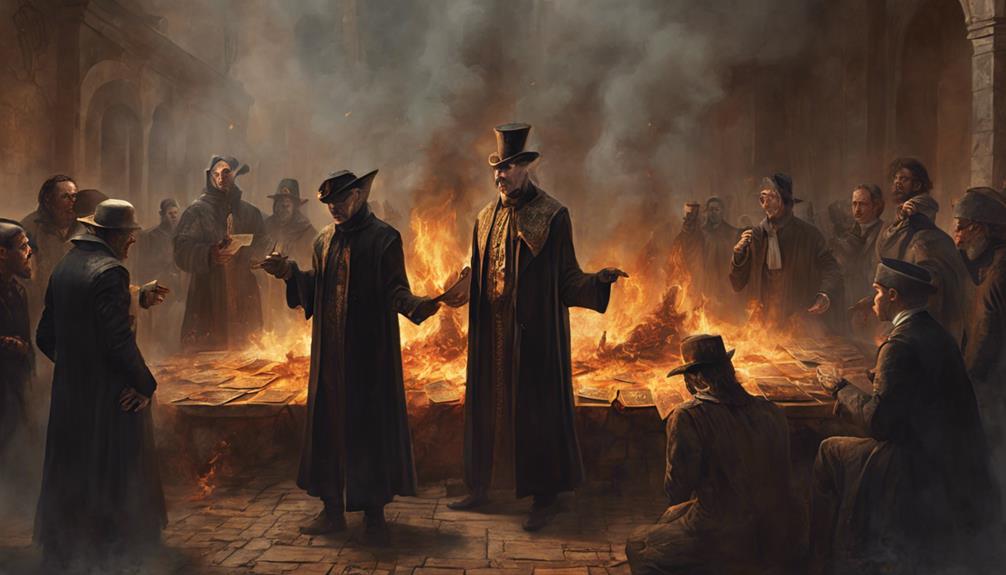
The Inquisition's stance on divination practices was clear and unwavering – they viewed it as a direct challenge to the authority of the Church and a dangerous form of heresy.
By claiming to predict the future or communicate with otherworldly beings, practitioners of divination were seen as undermining the Church's teachings and sowing seeds of doubt among the faithful.
These beliefs led to charges of heresy, prompting the Inquisition to take swift and severe action against those suspected of engaging in such practices.
Inquisition's View on Divination
Amidst the fervor of the Inquisition's investigations, their scrutiny of divination practices revealed a deep-seated aversion for the use of tarot cards and other forms of fortune-telling. The Inquisition's perspective on divination practices was rooted in their beliefs and principles, leading them to view such practices as heretical and dangerous.
Here are some key points to ponder regarding the Inquisition's stance on divination:
- Religious Opposition: The Inquisition saw divination as a direct challenge for the teachings of the Church.
- Supernatural Fear: They feared that engaging in divination opened individuals up for demonic influence.
- Control and Power: The Inquisition aimed to maintain control over religious beliefs and practices.
- Cultural Threat: Divination was seen as a threat for the established order and societal norms.
Reasons for Heresy Charge
Peering through the lens of suspicion, the Inquisition leveled charges of heresy against practitioners of divination, particularly those who dabbled in the forbidden art of tarot reading. Political motivations often intertwined with religious backlash during this tumultuous period, as those in power sought to maintain control and suppress any practices perceived as threatening.
Cultural fears played a significant role in shaping the Inquisition's stance on divination practices, with many viewing these mystical arts as a direct challenge to the established order. By targeting tarot users, the Inquisition aimed to exert social control and eliminate any perceived threats to the prevailing belief systems of the time. This confluence of political, religious, and social factors culminated in the persecution of individuals who dared to explore the mysteries of the tarot.
Religious Persecution of Alternative Beliefs
As the Inquisition intensifies its efforts, individuals practicing alternative beliefs, such as tarot reading, find themselves increasingly targeted and persecuted. The religious persecution of alternative beliefs is a dark chapter in history, marked by intolerance and fear of the unknown.
Here are four key points shedding light on this troubling era:
- Persecution Tactics: The Inquisition employed brutal tactics to suppress any deviation from accepted religious norms, including torture, public executions, and imprisonment.
- Religious Intolerance: Those who dared to explore alternative beliefs, like tarot reading, were deemed heretics and faced severe consequences for their practices.
- Freedom of Belief: The persecution of alternative beliefs highlights the importance of protecting individual freedoms and the right to practice one's faith without fear of reprisal.
- Impact on Society: The suppression of alternative beliefs not only silenced individuals but also stifled cultural diversity and intellectual curiosity, hindering progress and innovation.
In a time where freedom of belief is cherished, reflecting on past religious intolerance serves as a reminder of the importance of tolerance and acceptance in society.
Fear of the Unknown and Supernatural
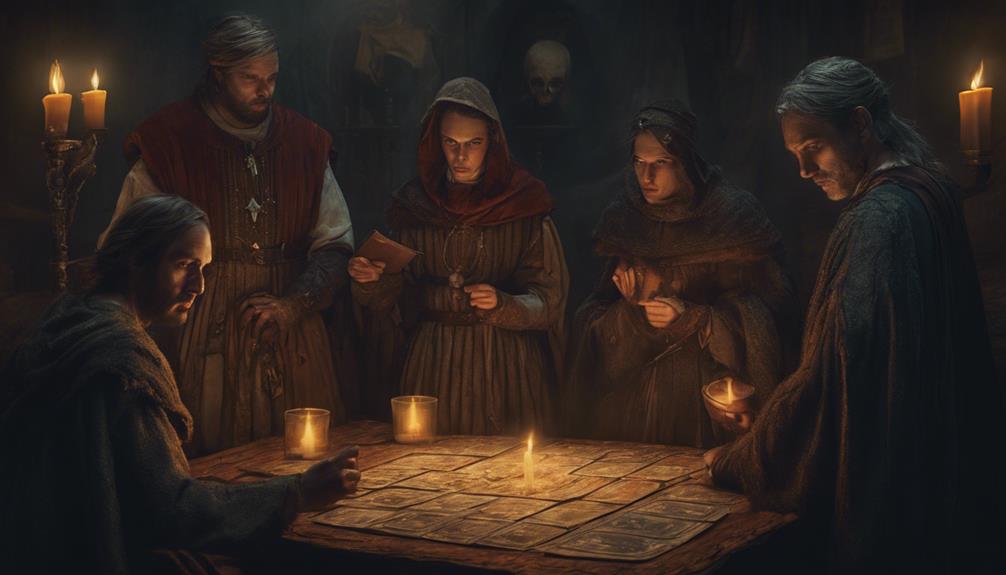
As whispers of supernatural threats spread, fear takes hold in the hearts of many. The unknown powers believed to be wielded by tarot users spark a deep-seated paranoia among those clinging to orthodox beliefs.
Tarot's mystique challenges the established order, forcing individuals to confront their fears of the unknown and the supernatural.
Supernatural Threats Breed Fear
Amidst the shadows of uncertainty and the veil of mystery, supernatural threats lurk, instilling fear in the hearts of many. The unknown and the supernatural have long been intertwined with human emotions, leading to a myriad of superstitions and anxieties.
Here are four reasons why supernatural threats breed fear:
- Lack of Understanding: The mysterious nature of supernatural phenomena often leaves people feeling helpless and vulnerable.
- Cultural Influence: Beliefs passed down through generations can amplify fear of the supernatural.
- Media Portrayal: Movies, books, and folklore sensationalize supernatural entities, fueling fear in society.
- Personal Experiences: Encounters with unexplained events can deeply impact an individual's perception of the supernatural, fostering fear and uncertainty.
Unknown Powers Spark Paranoia
Unknown powers lurking in the shadows often spark paranoia and unease among those who fear the supernatural and the unexplainable. Throughout history, individuals with hidden abilities have been subject to paranoid accusations and suspicion, especially during times when society feared what it couldn't comprehend.
The mere suggestion of possessing supernatural powers was enough to incite fear and distrust among communities, leading to the persecution of those believed to wield such abilities. This fear of the unknown often resulted in harsh treatment towards individuals who were perceived as threats to the established order.
The allure of mysterious powers and the uncertainty they brought with them fueled a sense of unease that could quickly escalate into paranoia, driving people to extreme measures in an attempt to eliminate perceived threats.
Tarot's Mystique Challenges Orthodoxy
The allure of Tarot's mystique challenged traditional beliefs and sparked fear of the supernatural among those entrenched in orthodoxy.
- Challenges to Tradition: Tarot's mystical symbolism and unconventional interpretations clashed with established religious doctrines, causing discomfort among the orthodox.
- Mystical Resistance: The mysterious nature of Tarot readings and their perceived ability to reveal hidden truths posed a direct challenge to the rigid structures of traditional belief systems.
- Fear of the Unknown: The enigmatic allure of Tarot cards and their association with predicting the future instilled a sense of unease in those wary of embracing the unfamiliar or unexplained.
- Supernatural Intrigue: The perceived connection between Tarot readings and supernatural forces fueled speculation and apprehension among those who feared the influence of otherworldly powers.
The Role of Tarot in Challenging Orthodoxy
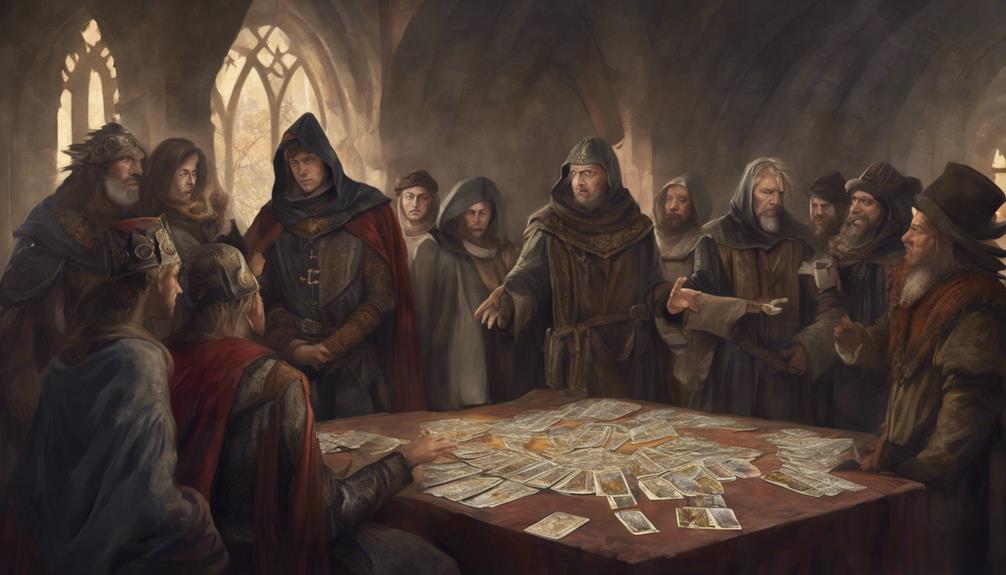
Challenging established beliefs and norms, the practice of Tarot has long been a source of fascination and controversy within various societies throughout history.
Tarot's influence has often clashed with religious authority, as its mystical interpretations and divination practices posed a challenge to orthodox religious doctrines.
The Tarot cards, with their rich symbolism and enigmatic imagery, have been seen as a tool for seeking hidden truths and exploring alternative spiritual paths beyond the confines of traditional religious teachings.
Interrogations and Punishments of Tarot Users
Amidst whispers of heresy and defiance, authorities relentlessly pursued those who dared to wield the power of Tarot for their own enlightenment and guidance. The interrogations and punishments of Tarot users during the Inquisition were severe and aimed at suppressing any perceived threat to the established order.
Here is a glimpse into the harrowing experiences faced by those who dared to explore into the world of Tarot:
- Tarot Symbolism Decoded: Interrogators often probed the intricate symbolism present in Tarot cards, viewing them as coded messages of subversion.
- Historical Context Revealed: The historical context of the Inquisition shed light on why Tarot users were perceived as threats to religious and political authorities.
- Tortuous Interrogations: Many Tarot users endured brutal interrogations, where they were coerced into confessing to heretical practices linked to Tarot.
- Punishments for Defiance: Those found guilty of Tarot-related heresy faced severe punishments, ranging from imprisonment to public executions, serving as a stark warning to others.
The Inquisition's relentless pursuit of Tarot users reflects a dark chapter in history where freedom of thought and expression was suppressed in the name of orthodoxy.
Legacy of the Inquisition's Suppression of Tarot
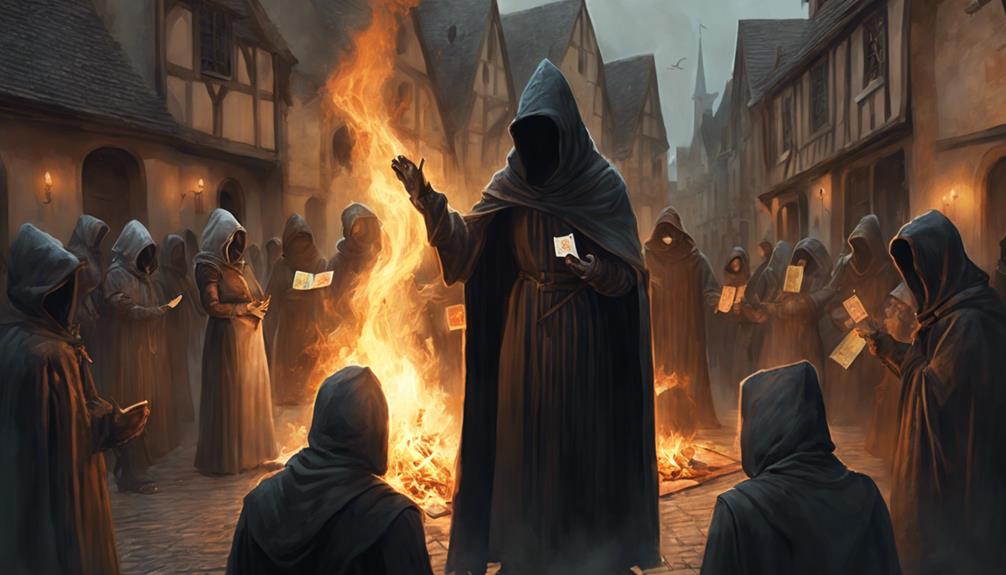
Despite the Inquisition's efforts to suppress Tarot, its legacy continues to influence modern perceptions and practices surrounding this ancient form of divination. The Inquisition's impact on Tarot was profound, leading to its stigmatization as a tool of the occult and heresy. However, despite attempts to eradicate it, Tarot has experienced a resurgence in recent years, reclaiming its place as a respected method of spiritual guidance and self-reflection.
—
| Legacy of Inquisition's Suppression of Tarot | ||
|---|---|---|
| *Effects* | *Modern Impact* | *Resurgence* |
| Tarot viewed as heretical | Tarot misunderstood as evil | Tarot embraced for self-discovery |
| Suppression led to secrecy | Tarot associated with mysticism | Tarot gaining popularity in mainstream culture |
| Fear of persecution stifled Tarot's practice | Tarot seen as a legitimate tool | Tarot integrated into psychological therapies |
| Tarot driven underground | Tarot used for introspection | Tarot celebrated as a cultural treasure |
| Legacy of suspicion still lingers | Tarot utilized for empowerment | Tarot evolving to meet modern needs |
Frequently Asked Questions
How Did the Inquisition Differentiate Between Different Forms of Divination, and Why Did They Specifically Target Tarot Users?
During the Inquisition, various forms of divination were scrutinized. Tarot users were targeted due to their perceived use of heretical practices. The Inquisition aimed to suppress consequences of such practices and their perceived cultural impact on society.
Were There Any Instances of Individuals Being Able to Defend Themselves Against Accusations of Heresy Related to Tarot Use During the Inquisition?
Defense strategies during the Inquisition varied, with some accused tarot users utilizing legal precedents or demonstrating the cards' innocent nature. Despite challenges, a few managed to escape harsh punishment through clever arguments and strategic defenses.
Did the Inquisition's Suppression of Tarot Have Any Long-Term Effects on the Practice of Divination or Alternative Spiritual Beliefs?
Modern practices of divination and alternative spiritual beliefs have evolved from the historical suppression of tarot by the Inquisition. The consequences were profound, shaping contemporary interpretations. Despite the past, the enduring allure of tarot endures, a testimony to human resilience and curiosity.
How Did the Fear of the Unknown and Supernatural Play a Role in the Inquisition's Targeting of Tarot Users?
The fear of the supernatural and the role of the unknown fueled the Inquisition's targeting of tarot users. Misunderstanding and suspicion led to the demonization of those who practiced divination, perpetuating a cycle of persecution and oppression.
What Impact Did the Inquisition's Persecution of Tarot Users Have on the Broader Cultural Perception of Tarot and Other Forms of Divination in the Centuries That Followed?
What impact did the inquisition's persecution of tarot users have on the broader cultural perception of tarot and divination? Did it embed a lasting cultural stigma, shaping beliefs on the mystical arts for centuries to come?


